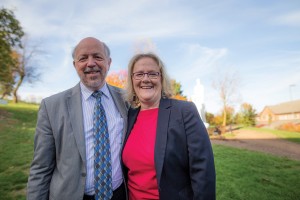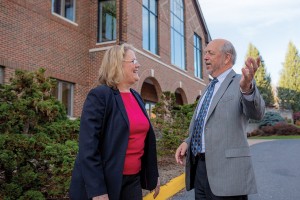
Seminary dean Michael A. King and his wife, Joan.
Growing up in a family of 11, Michael A. King ’76, dean of Eastern Mennonite Seminary, learned quickly that survival went to “the fittest.” In this essay, he muses on how learning to give in community, encouraged and inspired by his “soulfully generous” wife Joan, is an important contributor to one’s spiritual commitment to God’s kingdom here on earth.
Some of us need help sharing the breakfast cake. Let me explain. When nearly 40 years ago my wife-to-be Joan and I went through premarital counseling, our pastor-friend mostly did a great job. That was until he gently pointed out that of course I as one of nine siblings would understand sharing. Joan as the only child of a widow would probably need to learn. We burst out laughing. One thing was already clear: the gift of generosity was woven into the very fabric of Joan’s soul—but not mine.
Having eight siblings had actually taught me survival of the fittest: if I wanted enough food, I had better take more before a greedy brother or sister grabbed it. Speed was of paramount importance, especially since half of us were teenagers and could shove in a cow with one bite.
To this day, Joan blanches when she hears my younger siblings tell of the breakfast-cake era. Some of us older siblings loved our mom’s crumb cake made with flour, sugar and lots of butter—but were tired of sharing. So we’d make our own, stash it in the refrigerator, and wave warning fingers at the pools of longing which were our little brothers’ and sisters’ eyes: steal one bite and wish you hadn’t. Then at leisure and sometimes in front of them, we’d devour the entire cake.
That is not something to be proud of. This article is one effort to atone—and to name the reality that even the most generosity-challenged among us can find strategies of giving that fit not only our strengths but also our abysmal weaknesses.
In Joan’s and my case, pooling our giving and hoarding strengths and weaknesses involved grasping simple truths. Indeed I was oriented toward hoarding breakfast cakes; Joan was inclined toward generosity.

Michael A. King ’76, seminary dean, says his marriage to Joan has been a beneficial and character-building partnership: Joan’s capability to give joyfully and her encouragement that he join her to do so balances his own innate “prudence,” honed by his childhood among eight siblings.
Like me, Joan was shaped by the environment of her childhood and the people around her: her grandparents gave even when it hurt (including during the Great Depression). Their kitchen table was a place where everyone was welcome; no matter how much food there was, somehow it was always enough. Joan is no irresponsible spender, but if she sees need, she is more inclined to give joyfully than to hang on to a prudent portion of resources.
In our long marriage, we both recognize the merits of the other’s tendencies. As we see older-age realities on the horizon and have experienced our parents’ financial needs, we’ve grasped that inadequate retirement resources would likely leave our children holding too much of the bag.
On the other hand, the inequities confronting the world are real and often brutal. While millions to billions are among those Jesus names in Matthew 25 as the unclothed, hungry, thirsty, sick, and imprisoned that the rest of us are to care about, some projections are that the world’s richest 1% will own roughly half the entire planet’s wealth by next year.
Joan and I certainly have enough—and more.
This collection of simple truths leads me to the revelation that being a good steward of the breakfast cake means doing better than eating it all, piece by piece, while siblings watch.
We reach such conclusions partly through life experience. But researchers are also pondering what spurs generosity. One study funded by the John Templeton Foundation/University of Notre Dame Science of Generosity Initiative explores how different religious traditions stir generosity. Amid variations, the study finds commonalities, including core teachings of a tradition that foster generosity—such as my citing Jesus—and valuing community.
“People are interested in finding out about their own religion,” observes professor Carolyn Werner, leading the study at Arizona State University’s Center for the Study of Religion and Conflict. “For many of the study participants, the experience of being generous is, in and of itself, profoundly religious.”
Another valuable source for grasping the importance of generosity is Henri J. M. Nouwen’s A Spirituality of Fundraising (Upper Room Books, 2010). As one sometimes approached for funding or at other times requesting or thanking donors for funds, I’m inspired by Nouwen’s conviction that at their best, fundraising activities, whether involving the giving or the requesting, call us “to deeper commitment to our particular ministry” which “helps to make visible the kingdom that is already among us.”
Still, I’d not be telling the full truth if I didn’t stress this: Living with a spouse who models and constantly encourages generosity is the single most important source of whatever impulse toward generosity my Breakfast-Cake-Hoarding-Self is learning. This suggests the importance of learning about giving and receiving in community, in ways true to our original inclinations yet also ever encouraging us to grow beyond our own limitations. Together we can learn how to live now into the meaning of praying, with Jesus, for God’s kingdom to come not only in heaven but also right here on earth.